Bell-ringers in Stohos, Thessaloniki, Picture: www.clickatlife.gr
Most people may associate the feast of the first Sunday before Lent in Greece with big carnivals, parades and wild dancing. However, a lot of places in the country keep customs and traditions that have been passed unchanged from generation to generation. Traditions for this holiday in Greece are sometimes related to history and myths of the area, but other times they are simply an occasion for an escape from everyday life. Preparation often starts weeks before the holiday, and the peak is on the first Sunday before Lent, when each region holds large celebrations until the morning of Clean Monday.
Northern Greece
Naoussa
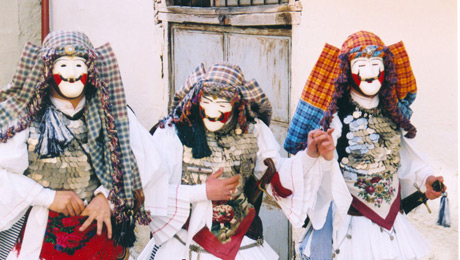
Originating from the Dionysian festivals, the custom "janissaries and brides" is still alive. On the first Sunday before Lent, to the sound of drums and zournas, a large number of "janissaries" wander the streets of the city and gather in front of the City Hall, where the feast is held. The bride (a disguised young man), comes to the window and, with characteristic movements, so that the sound of the gold coins of his attire can be heard, he greets the janissaries, goes downstairs and joins the crowd. Gradually, people of all ages gather and take part in the revival of the custom.
Xanthi
On the first Sunday before Lent, in Xanthi, on the bridge of the Kosintos River, the custom of "Burning the king" comes to life. The king is a human-like figure standing on sticks, which burns and chases Evil. The custom was brought by Samakov refugees to Eastern Thrace and it is revived every year by the inhabitants of the neighbourhood of the same name. After the king has been burnt, celebrations continue until the morning.
Kozani
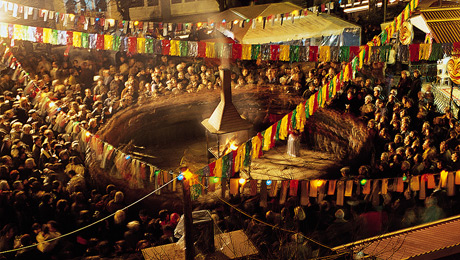
Fanos, the symbolic torch of holiday fire has been lit for centuries in Kozani. Regardless of the disputes about its origin, this custom gives the city a festive mood. On the first Sunday before Lent, the largest "Fanos", is lit on the central square, followed by smaller neighbourhoods that also burn their own "Fanos" ... and a mad celebration of a Dionysian kind starts. An increasing number of people gather around the fire and songs merge with one another. Most songs are playful and satirical. Wine is poured, local specialties are abundant and the feast lasts until the morning.
Ioannina
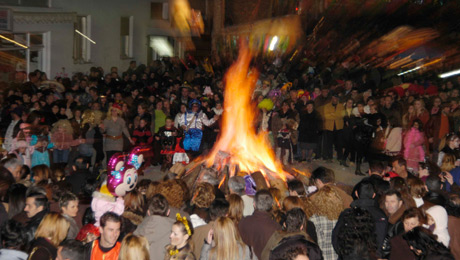
"Jamals" - festive fires on the first Sunday before Lent - burn in different districts of Ioannina on Sunday evening before the Long Lent. This custom has existed since the nineteenth century, and, since the '80s, it has been recreated every year. "Jamals" warm people up after the cold winter, and the big celebration starts with lighting the first match.
Serres
The custom "Kaluger" (meaning monk) comes from the region of Serres. It starts with "fire-dancers" and mimes that form a bizarre troupe, the members of which include the king, the king's son, the monk, the bride, the grandmother with the prematurely born baby, the Gypsies with the bear and the guards. The troupe visits all the houses in the village, and then the inhabitants gather in the square, where the field is prepared for planting. A scene of death and resurrection follows, with the monk playing the main part.
Sohos, Thessaloniki
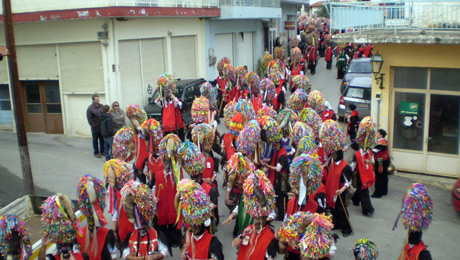
This custom is associated with fertility and, for many people, with love, too. "Bell-ringers" may be seen even today in Sohos. This is a very ancient custom, which has remained unchanged for centuries. The peak of the holiday is during the three days before Clean Monday and people dressed in goat costumes, with bells all over their attire, dance in the streets and squares. The custom of forgiveness also enjoys a special status. Traditionally, the elderly forgive the sins of the young who visit them and kiss their hand, giving them an orange.
The islands
Karpathos
On Clean Monday, Karpathos holds the "People's Court for immoral behaviour." This is an opportunity for purification and administration of justice at the beginning of the Long Lent. The defendants are those who insult or provoke others by their behaviour. Local guards who arrest "the perpetrators" take them to court. The elders of the island are judges, and that is the reason for the jokes as the harbinger of the holiday.
Naxos
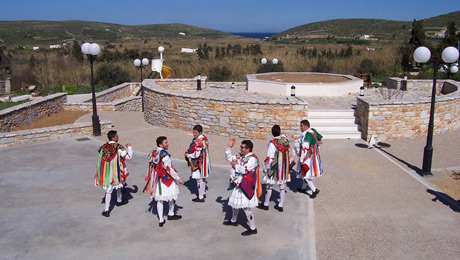
Even today, the worship of Dionysus can be traced in the traditions for the first Saturday of Lent in Naxos. Festivities begin on the first Saturday of Lent with the slaughtering of pigs. On "Meat" Sunday, "bell-ringers" wander the streets - these are hooded youths with bells hanging around their waists. Their dance is accompanied by the sound of the bells and they banter with the people. Locals always give them boiled eggs. The group includes "The old man", "The old woman" and "The bear." Some of the scenes which are performed include "The Wedding of the Bride," "Death," "Resurrection of the Dead." On Clean Monday, young men dressed in kilts go out in the streets and play violins.
Leros
Customs of the island of Leros also have a playful character. In the old days, "scoundrels", painted with charcoal and wrapped in blankets, wandered the streets and teased villagers. Today, that role is played by "poets." With imagination and a sarcastic mood, they create funny rhymes and young children dressed as monks go from house to house and recite them. A grand celebration follows, with traditional music, ouzo, wine and traditional snacks. The same custom is celebrated on the islands of Kos and Symi.
Amorgos
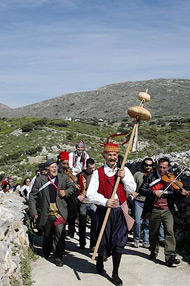
In Egiali, and more specifically in the village of Langada, the custom of "The Captain" comes alive. Young people dressed in traditional costumes, to the sounds of local musical instruments, go to the local church. There, the village priest throws something like a robe in the air and whoever catches it is called "The Captain". Then, the parade of youths begins, which ends in the square. The new captain chooses a girl who becomes the "Lady Captain". The feast lasts until the morning of Clean Monday with singing, dancing, brandy and fried fish. The custom of the island of Serifos is similar.
Skyros
If you want to hear the events of the year, presented satirically, then Skyros, during the first Sunday before Lent, is the perfect place. Its inhabitants, mostly fishermen, indulge in rhymed satire, that overviews the major events of the past year. Groups of mummers wander the forests, and you may encounter "Elders" with bells and "Franks." If two groups of mummers meet, they compete with one another, ringing their bells and making a great noise.
Corfu
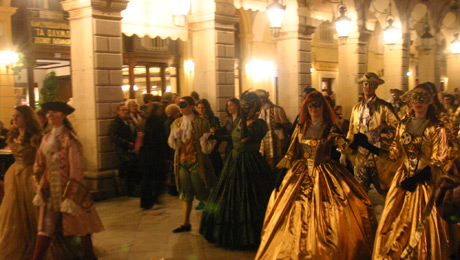
Corfu's rituals are of Venetian and ancient Greek origin. The carnival of the island has already become famous, but there are also lesser-known local customs. For example, on the first Sunday before Lent. Just before all the events have finished, the town crier comes out and announces the arrival of the Lord of the Carnival. After reading aloud his will, everything is ready for the end of carnival. Some villages of Corfu still celebrate the customs "The wedding" and "The dance of priests."
Crete
Rethymno
The inhabitants of Gergeri village, dressed in sheepskins with belts with bells and filthy faces and hands, go out in the streets and indulge in a "bear" dance. Tied together, they follow each other, run, dance and tell jokes, creating an atmosphere of exultation.
Yet another tradition has survived in the area of Rethymno - "The stealing of the bride". The groom and bride are disguised men holding a doll-baby with a painted moustache, in order to resemble his "father". Other role plays include "The field and seed" and "The camel", which is formed by an animal's skull and two men running hidden under large canvas, recreating a four-legged animal.
Central Greece, Thessaly
Amfissa
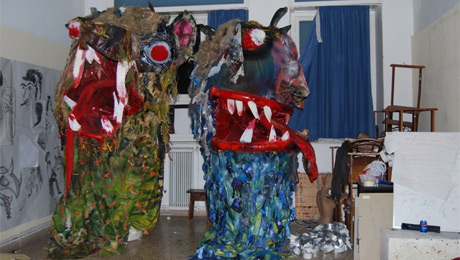
During the last weekend of Lent, the myth of the "spirit" comes alive in Amfissa. From the neighbourhood of Harman, where the old leather workshops are located, and up the staircase of St. Nicholas, the "spirit" rises followed by a group of people dressed in costumes. The big historical cafe of the city hosts endless conversations of satirical nature about myths and ghosts. Traditionally, in the area, "spirits" are the souls of dead people or animals that haunt the surrounding area.
Galaxidi
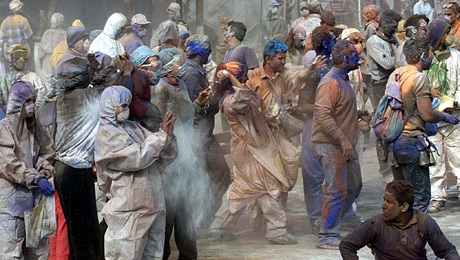
"The Flour War" has been an institution for three centuries. Large quantities of flour are shot against the participants in the carnival, whose faces must be painted with charcoal. In recent years, people paint their faces with other substances, such as shoe polish. The custom dates back to the period of the Ottoman rule.
Thebes
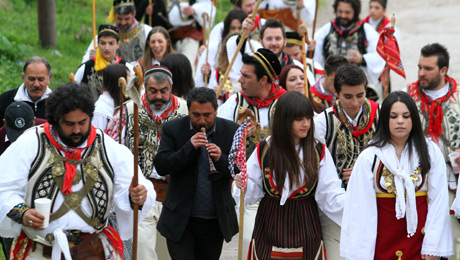
In the area of Thebes, a "Wallachian wedding" is recreated on Clean Monday. The multicolour wedding procession and traditional instruments that accompany it are a harbinger of the great festival, which will take place on the evening of the last Sunday before Lent in the central square. The roots of this custom date back to 1830, when the shepherds - Wallachians of Macedonia, Epirus, Thessaly and Roumelia - abandoned their pastures in order to seek grasslands to the south.
Larissa-Tyrnavos
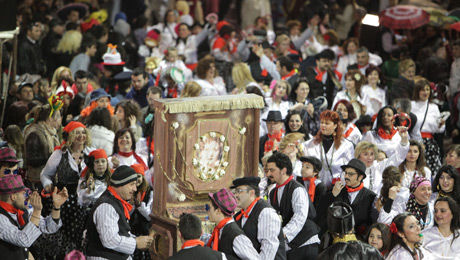
On the last Tuesday before Clean Monday, residents of Tyrnavos start a series of events in honour of the god Dionysus, and the peak event is the "Bourani" (this is a kind of soup). During the preparation, scenes with phallic symbols and bold banter are acted out.
The Peloponnese
Kalamata
The central square of Kalamata holds the custom "Wallachian wedding". Participants are dressed up in costumes and meet in the square, where they start a party with dancing, songs and treats.
Methoni
Every year, "Koutroulis's Wedding" is organised in Methoni. This is a wedding-parody with a carnival mood. The "newlyweds" are disguised men, and the marriage takes place in the central square in the presence of relatives and many witnesses. The ceremony is performed by a priest. A party follows that lasts until dawn.
Messinia
The feast of the fire enlivens the evening of the First Sunday before Lent. Residents light fires in the neighbourhoods of the city and festivities begin with dancing until dawn. Old traditions and stories are revived. On Clean Monday, a restoration of the execution of the old woman Siko, who was hanged at this place by order of Ibrahim Pasha, is performed in the area. In the afternoon on the same day, costumed young and old people, as well as dance groups go on a procession.